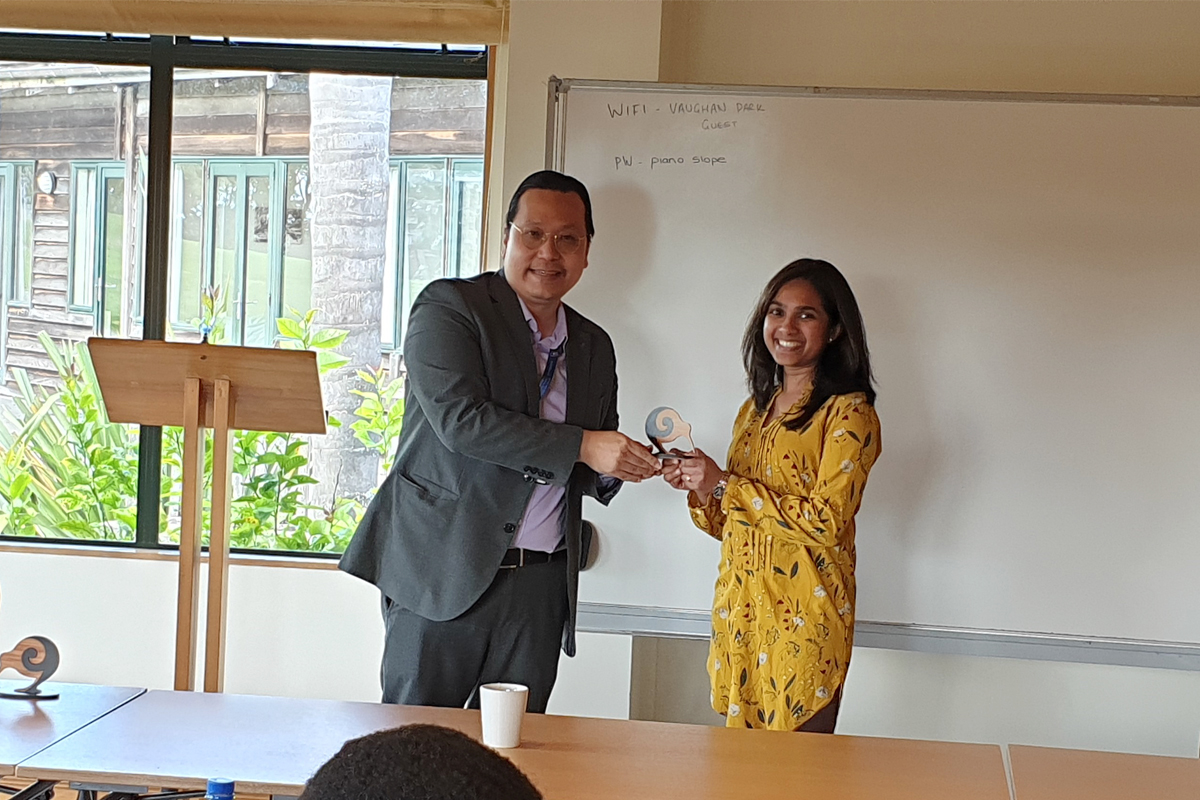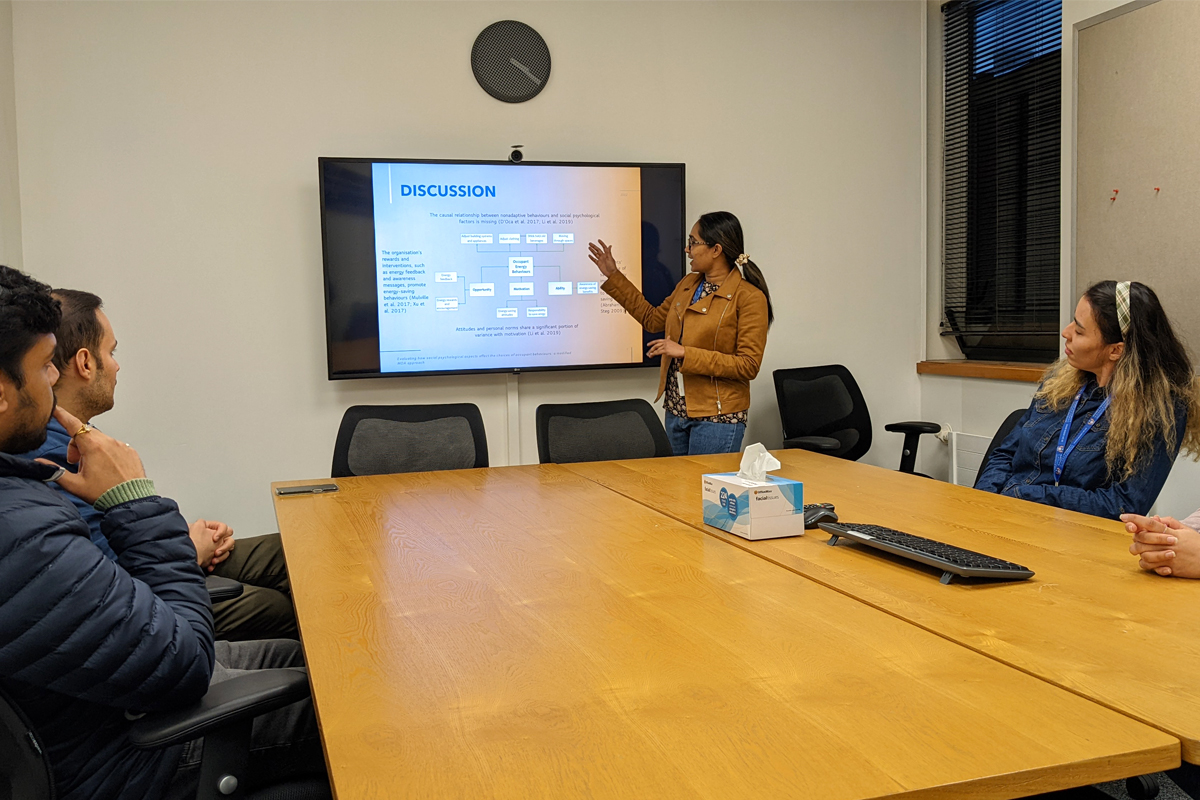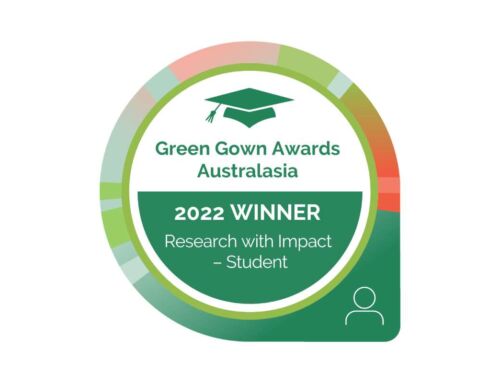Massey University
I am a third-year PhD student and a Tutor at the School of Built Environment, Massey University. My passion for Sustainability promotes social, environmental, and economic knowledge and the implications for energy-efficient built environments. I am currently researching the “impacts of occupant energy behaviours on building energy consumption”. In the past, I wrote several papers and a book chapter on “life cycle cost assessment of green buildings and green retrofitting”, which have contributed to the research on promoting sustainable buildings and green features in the existing building stock.
> A closer look
I have always been passionate about contributing to education from a young age. I believe tertiary education is the key to developing new knowledge and technology for the future community in any country.
Research
In 2016, as a fresh graduate, I chose the research pathway and collaborated on a project on “Impact of Sustainable Features on the Life Cycle Cost (LCC) of Green Buildings.” This research promotes Sustainability thinking among industry practitioners, encourages them to select green buildings over conventional ones, and refurbish the existing buildings with sustainable features. Additionally, I was involved in four research grants worth up to LKR 1.5 Million and held responsibilities for preparing research proposals, conducting research projects, writing research papers, and submitting for possible publications. I also won an International Travel Grant worth LKR 200K from the National Science Foundation, Sri Lanka, to participate at the 32nd Annual ARCOM (Association of Researchers in Construction Management) Conference and General Meeting in Manchester, UK, in September 2016 and to present the LCC implications of sustainable features in office buildings.
I enrolled in the Doctor of Philosophy program at the School of Built Environment, Massey University, in 2019, where I am challenged and pursued further development in my skills, knowledge, and experience. With Massey, I started my current research project on “Impact of Occupant Behaviours on Energy Consumption of Office Buildings.” Knowledge of multi-domain comfort stimuli and the influence of environmental, contextual, and social-psychology factors on occupant energy behaviours are essential to consider alongside the advanced building design and technology to achieve energy reduction goals. The study enables how occupants feel the indoor environment, how their personal and social-psychological perspectives influence their behaviours, and how building managers prioritise the occupants’ comfort and behaviours, thereby influencing building managers to embrace occupants to the companies’ energy culture. The building managers may change the energy-consuming behaviour of occupants through channelling knowledge and awareness, energy feedback, and more responsibility for their impact on energy,
My research is published in high-impact journals: Energy and Buildings (Q1, 7.201), Sustainable Development, Smart and Sustainable Built Environment, Built Environment Project and Asset Management, and Facilities. During my PhD I also won several awards: Best Confirmation Presentation (2020), PhD culture award (2022), Best Sustainability-themed Paper Award (AECOM Sponsored Award, NZBERS 2022), and School of Built Environment Research Innovation Award (2022) for my impact on Sustainability related research producing high-quality research publications.
Teaching
Coming from a Facilities Management (FM) background, Sustainability is always at the forefront of FM’s curriculum. I have contributed to teaching, assessing, and evaluating students in this field. Also, I have engaged in content development in Facilities Management courses since 2017, which embedded Sustainability concepts: energy management, sustainable building materials, waste management, ISO energy and environmental management systems, and climate change for the construction industry.
In 2021, I also had the opportunity to work as a research assistant for a research project titled “The relationship between building design and performance: A New Zeland office user satisfaction model,” funded by Facilities Management Association New Zealand (FMANZ) Research and Innovation Grant, and we presented the project outputs including the occupants’ perspectives on establishing mandatory sustainable practices in the office environment for industry partners at the FM Summit 2021.
Engagement
From 2020-2021, I volunteered as the Vice President (Administration) of the CIB (International Council for Research and Innovation in Building and Construction) student chapter at Massey University. In this role, I participated in monthly CIB committee meetings, prepared meeting agendas and minutes, organised research seminars, and was involved in funded research projects. While on duty, I was able to contribute to two research projects/awards:
- The CIB Sebestyén Future Leaders Award 2022 – Lessons learned from the impact of Covid-19 – A case study of skill shortage in the construction workforce
- CIB Student Chapter Funding 2021 – A collaborative study across the student chapters on Higher Degree by Research (HDR) training in Built Environment (RMIT University, Hong Kong Polytechnic University, Massey University, Tsinghua University, University of Hong Kong, Western Sydney University)
My objective is to pursue in-depth and rigorous research about the pressing challenges of built environment Sustainability and the processes of environmental, economic, and social development in built environments to excel in the field of sustainable development for the excellence of sustainable education and community engagement. Therefore, I aspire to keep a modest mindset, learn continuously, and work hard to reach reflective milestones by engaging in research, teaching, and community engagement activities.
> Impact and benefits
The impacts of my research are mainly evident in multidisciplinary research output like articles, chapters, and conference papers on Sustainability, green buildings, energy efficiency, and life cycle costs (LCC) implications in the built environment, which have been widely cited by peer researchers, leading to an H-index of 5. My highly cited publication “Economic Sustainability of green buildings: a comparative analysis of green vs. non-green” (2018) has almost 1600 reads in ResearchGate. New Zealand Built Environment Research Symposium (NZBERS) awarded the Best Sustainability-themed Paper Award for my recent conference paper, “Self-reported occupant behaviours and multi-domain comfort preferences in New Zealand tertiary office buildings” (2022), where I highlighted the relationship between occupant energy behaviours, comfort preferences, and influential factors. Recently a research article titled “A facilities management approach to rationalising occupants’ energy behaviours” has been accepted for publication by a Q1 journal, and this article conceptualises the preliminary findings of my research. Another paper titled “Evaluating how social psychological aspects affect the choices of occupant behaviours: a modified MOA approach” was submitted to the 38th ARCOM Conference and Annual General Meeting that will be held in September 2022 in Glasgow, Scotland, where I will present my research work to the wider international community. This research stresses the importance of reconsidering the human-building interactions while promoting more energy-efficient office buildings in the post-pandemic era.
Through my PhD research addressing the impacts of occupant energy behaviours on building energy consumption, I am trying to rationalise occupant energy behaviours using occupant comfort preferences and environmental and social-psychological drivers of these behaviours. The final framework of my research aims to convert traditional organisational energy culture to an occupant-centric energy culture that addresses occupants’ preferences in the building design and operation to mitigate the energy impacts of building occupants. At the different stages of my data collection, I collected perspectives of almost 400 office building occupants on their comfort preferences in the built environment and social-psychological aspects that can positively contribute to their behaviours in buildings. These occupants represent the general office building community and the occupants of tertiary office buildings in New Zealand. The findings will highlight the struggles that occupants face when coping with the indoor environment, what opportunities exist for them to contribute to the building’s energy savings, and how mindful building managers are of the energy impacts of occupants. Increasingly I promote energy-efficient built environments as a pathway to Sustainability and achieving SDGs: responsible consumption and production and climate action. Publications output from my PhD research enable the following impacts on the industry and academia;
- enables opportunities to promote collaboration between building managers and occupants by comparing perspectives on occupant energy impacts
- encourages energy-conscious occupants to achieve the organization’s energy targets through knowledge and awareness, energy feedback, and authority
- assesses the combined effects of comfort preferences, occupant energy behaviours, and various environmental, building, and socio-psychological factors for modelling energy-saving behaviours in office buildings
- stresses the importance of reconsidering the human-building interactions while promoting more energy-efficient office buildings in the post-pandemic era
- contributes to achieving the Net Zero Energy goal by 2050
As a past member of the CIB student chapter at Massey University, I contributed to securing research awards worth € 3,500 within the first two years of the CIB student chapter at Massey University has been created. The research outputs from these awards are in progress, creating a level of responsibility as a team to follow through on the chapter’s goals and commitments. Collaborative research seminars with other student chapters were also initiated during this time, promoting collaborative research with peers from countries like Australia, China, and Hong Kong. The student chapters conducted three research seminars addressing research on Sustainable built environment and Innovative information technology in the built environment. Massey’s student chapter is the only chapter from a New Zealand university linked to the CIB world organisation. We aim to engage with the innovative research and development in CIB Commissions and Task Groups and to network with other CIB Student Chapters across the Asia-Pacific region and globally.
As a PhD student at the School of Built Environment, Massey University, I won the Best confirmation presentation award in 2020 for my initial research proposal, where I encouraged peer students to do impactful and high-quality research. I support my peers in visualizing literature using computer tools (i.e., CiteSpace, VOSviewer), distributing online questionnaires (i.e., Qualtrics), and life cycle cost assessment and cost modelling. Through my research journey, I have collaborated with an interdisciplinary team of colleagues from Construction, Architecture, Quantity Surveying, and Facility Management to inspire research on Sustainability in the built environment. I was also invited to review articles from Building Research and Information, Energy and Buildings, and the International Journal of Construction Management which recognised my expertise in energy, green buildings, and life cycle assessments of built environments.
> Leadership and engagement
I demonstrated leadership skills as a mentor and a facilitator of Sustainability actions. As a past member of the Massey University CIB student chapter, I am a peer mentor for the newly appointed committee for 2022 and volunteer for future research activities relating to Sustainability in Built Environment. Recently, I joined CIB task group 124 to promote research on Net-zero carbon building design and construction that contribute to SDG: Climate Action. I am also a tutor in the Sustainability and Climate Change course at the school of Built Environment, Massey University. I volunteered for the supporting committee of NZBERS 2022: Creating Capacity and Capability for the Future of the Built Environment, which disseminated Sustainability related research along with other construction and built environment related research.
My current research engages the occupants of the tertiary office buildings to promote Sustainability and energy consciousness among the university community and the office building occupants across the different regions in New Zealand. I was a contributing student for Constructing Climate Action – Massey University’s approach to sustainable and low-carbon buildings. Following consultation with the Director of Sustainability, Massey University Prof Allanah Ryan, my research findings were presented in a Poster for the Massey University Green campus day 2022.
As a third-year PhD student, I received the PhD culture award for my engagement with the School of Built Environment staff and students. This recognition is close to my heart as I am passionate about giving back to the university community sustainably.
> Wider societal impact
I believe that to make a more significant impact, I must expose to Local and International industry expectations to achieve the Net Zero Carbon Goal by 2030 and 2050. As a student member of NZIOB, FMANZ, and ARCOM communities, I regularly follow up on the Sustainability related research activities associated with these institutional bodies and ensure that my research aligns with the Sustainability goals for the benefit of wider society. Presenting my research on international platforms: ARCOM, Engineering, Project, and Production Management (EPPM), Australasian Universities Building Education Association (AUBEA), and Australasia and South-East Asia Structural Engineering and Construction (ASEA SEC) enables me to identify Global sustainable expectations, welcome critiques on my research, and produce highly impactful research for the wider community. Through my research on the energy-efficient built environment, energy-conscious community, and recognising occupant-centric energy cultures, I work towards promoting responsible consumption production and climate action.
As I started my PhD research very close to the Pandemic and have continued it during COVID 19 situations and post lockdown, I noticed the importance of considering flexible working solutions in my research. Therefore, my research focuses on reducing energy use and CO2 emissions to tackle climate change as buildings reopen with flexible working solutions and complex energy operations, believing that evolving operations in future offices can achieve energy efficiency through technical and social-psychological dimensions.





